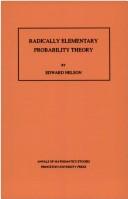| Listing 1 - 2 of 2 |
Sort by
|

ISBN: 0691084734 0691084742 1400882141 Year: 1987 Publisher: Princeton Princeton University Press
Abstract | Keywords | Export | Availability | Bookmark
 Loading...
Loading...Choose an application
- Reference Manager
- EndNote
- RefWorks (Direct export to RefWorks)
Using only the very elementary framework of finite probability spaces, this book treats a number of topics in the modern theory of stochastic processes. This is made possible by using a small amount of Abraham Robinson's nonstandard analysis and not attempting to convert the results into conventional form.
Martingales (Mathematics) --- Stochastic processes. --- Probabilities. --- Martingales (Mathematics). --- Stochastic processes --- Probability --- Statistical inference --- Combinations --- Mathematics --- Chance --- Least squares --- Mathematical statistics --- Risk --- Random processes --- Probabilities --- Abraham Robinson. --- Absolute value. --- Addition. --- Algebra of random variables. --- Almost surely. --- Axiom. --- Axiomatic system. --- Borel set. --- Bounded function. --- Cantor's diagonal argument. --- Cardinality. --- Cartesian product. --- Central limit theorem. --- Chebyshev's inequality. --- Compact space. --- Contradiction. --- Convergence of random variables. --- Corollary. --- Correlation coefficient. --- Counterexample. --- Dimension (vector space). --- Dimension. --- Division by zero. --- Elementary function. --- Estimation. --- Existential quantification. --- Family of sets. --- Finite set. --- Hyperplane. --- Idealization. --- Independence (probability theory). --- Indicator function. --- Infinitesimal. --- Internal set theory. --- Joint probability distribution. --- Law of large numbers. --- Linear function. --- Martingale (probability theory). --- Mathematical induction. --- Mathematician. --- Mathematics. --- Measure (mathematics). --- N0. --- Natural number. --- Non-standard analysis. --- Norm (mathematics). --- Orthogonal complement. --- Parameter. --- Path space. --- Predictable process. --- Probability distribution. --- Probability measure. --- Probability space. --- Probability theory. --- Probability. --- Product topology. --- Projection (linear algebra). --- Quadratic variation. --- Random variable. --- Real number. --- Requirement. --- Scientific notation. --- Sequence. --- Set (mathematics). --- Significant figures. --- Special case. --- Standard deviation. --- Statistical mechanics. --- Stochastic process. --- Subalgebra. --- Subset. --- Summation. --- Theorem. --- Theory. --- Total variation. --- Transfer principle. --- Transfinite number. --- Trigonometric functions. --- Upper and lower bounds. --- Variable (mathematics). --- Variance. --- Vector space. --- W0. --- Wiener process. --- Without loss of generality.
Book
ISBN: 1400880564 Year: 2016 Publisher: Princeton, NJ : Princeton University Press,
Abstract | Keywords | Export | Availability | Bookmark
 Loading...
Loading...Choose an application
- Reference Manager
- EndNote
- RefWorks (Direct export to RefWorks)
Elements of Mathematics takes readers on a fascinating tour that begins in elementary mathematics-but, as John Stillwell shows, this subject is not as elementary or straightforward as one might think. Not all topics that are part of today's elementary mathematics were always considered as such, and great mathematical advances and discoveries had to occur in order for certain subjects to become "elementary." Stillwell examines elementary mathematics from a distinctive twenty-first-century viewpoint and describes not only the beauty and scope of the discipline, but also its limits.From Gaussian integers to propositional logic, Stillwell delves into arithmetic, computation, algebra, geometry, calculus, combinatorics, probability, and logic. He discusses how each area ties into more advanced topics to build mathematics as a whole. Through a rich collection of basic principles, vivid examples, and interesting problems, Stillwell demonstrates that elementary mathematics becomes advanced with the intervention of infinity. Infinity has been observed throughout mathematical history, but the recent development of "reverse mathematics" confirms that infinity is essential for proving well-known theorems, and helps to determine the nature, contours, and borders of elementary mathematics.Elements of Mathematics gives readers, from high school students to professional mathematicians, the highlights of elementary mathematics and glimpses of the parts of math beyond its boundaries.
Mathematics --- Math --- Science --- Study and teaching (Higher) --- Abstract algebra. --- Addition. --- Algebra. --- Algebraic equation. --- Algebraic number. --- Algorithm. --- Arbitrarily large. --- Arithmetic. --- Axiom. --- Binomial coefficient. --- Bolzano–Weierstrass theorem. --- Calculation. --- Cantor's diagonal argument. --- Church–Turing thesis. --- Closure (mathematics). --- Coefficient. --- Combination. --- Combinatorics. --- Commutative property. --- Complex number. --- Computable number. --- Computation. --- Constructible number. --- Continuous function (set theory). --- Continuous function. --- Continuum hypothesis. --- Dedekind cut. --- Dirichlet's approximation theorem. --- Divisibility rule. --- Elementary function. --- Elementary mathematics. --- Equation. --- Euclidean division. --- Euclidean geometry. --- Exponentiation. --- Extended Euclidean algorithm. --- Factorization. --- Fibonacci number. --- Floor and ceiling functions. --- Fundamental theorem of algebra. --- Fundamental theorem. --- Gaussian integer. --- Geometric series. --- Geometry. --- Gödel's incompleteness theorems. --- Halting problem. --- Infimum and supremum. --- Integer factorization. --- Integer. --- Least-upper-bound property. --- Line segment. --- Linear algebra. --- Logic. --- Mathematical induction. --- Mathematician. --- Mathematics. --- Method of exhaustion. --- Modular arithmetic. --- Natural number. --- Non-Euclidean geometry. --- Number theory. --- Pascal's triangle. --- Peano axioms. --- Pigeonhole principle. --- Polynomial. --- Predicate logic. --- Prime factor. --- Prime number. --- Probability theory. --- Probability. --- Projective line. --- Pure mathematics. --- Pythagorean theorem. --- Ramsey theory. --- Ramsey's theorem. --- Rational number. --- Real number. --- Real projective line. --- Rectangle. --- Reverse mathematics. --- Robinson arithmetic. --- Scientific notation. --- Series (mathematics). --- Set theory. --- Sign (mathematics). --- Significant figures. --- Special case. --- Sperner's lemma. --- Subset. --- Successor function. --- Summation. --- Symbolic computation. --- Theorem. --- Time complexity. --- Turing machine. --- Variable (mathematics). --- Vector space. --- Word problem (mathematics). --- Word problem for groups. --- Zermelo–Fraenkel set theory.
| Listing 1 - 2 of 2 |
Sort by
|

 Search
Search Feedback
Feedback About UniCat
About UniCat  Help
Help News
News